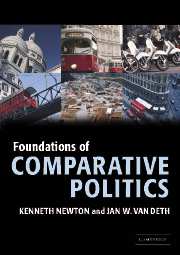Book contents
- Frontmatter
- Contents
- Acknowledgements
- List of briefings
- List of fact files
- List of controversies
- List of tables
- List of figures
- List of abbreviations and acronyms
- Key terms and concepts
- PART I The state: origins and development
- PART II The polity: structures and institutions
- PART III Citizens, elites and interest mediation
- PART IV Policies and performance
- 13 Political ideologies: conservatism, liberalism, Christian democracy and socialism
- 14 Decision making
- 15 Defence and security
- 16 Welfare
- 17 The future of the democratic state
- Glossary of key terms
- Index of names
- Index of subjects
17 - The future of the democratic state
- Frontmatter
- Contents
- Acknowledgements
- List of briefings
- List of fact files
- List of controversies
- List of tables
- List of figures
- List of abbreviations and acronyms
- Key terms and concepts
- PART I The state: origins and development
- PART II The polity: structures and institutions
- PART III Citizens, elites and interest mediation
- PART IV Policies and performance
- 13 Political ideologies: conservatism, liberalism, Christian democracy and socialism
- 14 Decision making
- 15 Defence and security
- 16 Welfare
- 17 The future of the democratic state
- Glossary of key terms
- Index of names
- Index of subjects
Summary
At the start of the third millennium, states and democracy seem to be the big winners in the fierce conflicts and wars that scarred the twentieth century. With only a few special exceptions every place on earth falls within the territory of a state. The number of states has increased rapidly from about fifty to not much fewer than 200 since the 1950s. States still claim absolute authority and control over their own territory and its residents, and conflicts between them are still hard to handle. Moreover, modern states are not the puny ‘night watchmen’ of the liberal era at the start of the twentieth century: they now extract vast amounts in taxes, provide an enormously wide variety of services and pervade almost every aspect of daily life.
Democracy also seems to have triumphed in the twentieth century. Three successive waves of democratisation – driven mainly by post-war de-colonisation after 1945 and the collapse of the Soviet Empire in 1989 – have expanded the number of stable democracies to approximately 120 countries, covering about 60 per cent of the world's population. Democracy has grown in depth and strength to cover far more than the most basic rights and duties and now includes universal adult suffrage, referendums, a wide range of legal, social and economic rights, direct participation, greater control over government and fewer privileges for elites.
- Type
- Chapter
- Information
- Foundations of Comparative Politics , pp. 329 - 345Publisher: Cambridge University PressPrint publication year: 2005



